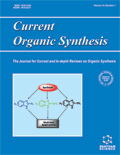To find the most relevant journal, please insert appropriate keyword to facilitate search.
Search Results: COS

Current Organic Synthesis
ISSN: 1570-1794 (Print)
eISSN: 1875-6271 (Online)
Special Issues With Active Call for Papers
Exploring the Role of Chemical Graph Theory in Advancing Current Organic Synthesis
Organic synthesis is a fundamental discipline in chemistry, crucial for the creation of complex molecules with diverse applications in pharmaceuticals, materials science, and beyond. However, the process of designing efficient synthetic routes for target molecules remains challenging. Chemical graph theory, a branch of theoretical chemistry, offers powerful tools for understanding molecular structure and reactivity, thus holding significant promise for revolutionizing organic synthesis methodologies. This special issue aims to investigate the application of chemical graph theory... see more
Design and Synthesis of Green Pesticides
The development of green new pesticides is currently one of the hotspots in the field of pesticide research, aiming to develop efficient, environmentally friendly, and safe pesticide products to meet the needs of modern agricultural production. Green new pesticides prioritize environmental friendliness and ecological safety. Therefore, during the research and development process, it is necessary to comprehensively consider factors such as the biological activity of pesticides, their environmental degradability, and their impact on non-target organisms,... see more